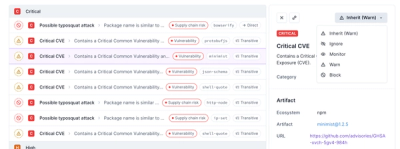
Research
Security News
Malicious npm Package Typosquats react-login-page to Deploy Keylogger
Socket researchers unpack a typosquatting package with malicious code that logs keystrokes and exfiltrates sensitive data to a remote server.
@sanity/block-content-to-html
Advanced tools
Readme
Converts the flat Sanity block content structure into HTML.
npm install --save @sanity/block-content-to-html
// The flat block content structure
const data = {
"_type": "block",
"style": "normal",
"spans": [
{
"_type": "span",
"text": "String with an ",
"marks": []
},
{
"_type": "span",
"text": "italicized",
"marks": [
"em"
]
},
{
"_type": "span",
"text": " word.",
"marks": []
}
]
}
// Now convert it with block-content-to-html
const BlockContentToHtml = require('@sanity/block-content-to-html')
const toHtml = new BlockContentToHtml()
const html = toHtml.convert(data)
This will result in html being:
<p>String with an <em>italicized</em> word.</p>
The constructor will take an object for options:
const toHtml = new BlockContentToHtml(options: Object)
Converting the block content is done by calling .convert:
toHtml.convert(data: Array|Object)
Options is an object with any of the following keys:
{
customTypeHandlers: {
...
},
blockTypeHandlers: {
textBlock: {
...
},
listBlock: {
...
},
span: {
...
}
marks: {
...
}
}
}
Read below for a closer description of each option.
customTypeHandlers: ObjectAn object with keys for your custom block types (which is not of type block).
Each key is mapped to a type, and their value is a function which will get the node as input.
It returns HTML.
customTypeHandlers: {
author: node => {
return `<div>${node.attributes.name}</div>`
}
}
The node in this example has the following structure:
{ type: 'author', attributes: { name: 'Test Person' } }
blockTypeHandlers: ObjectHandlers for manipulating the output of the default, built in, block types. The default block type holds either a block of text or a list. A text block is built up of spans (with marks), where a list block is built up of list items, which can contain a text block.
The blockTypeHandlers object can contain the follow keys:
textBlock: ObjectEach text block has a style. With this option you can manipulate how each style is rendered.
By default the style normal is wrapped in a <p>,
where other default styles are mapped 1:1 (style h2 produces <h2>).
The option works in a similar way as customTypeHandlers described above,
with the distinction that is has a children property, and the key is the style name:
textBlock: {
normal: node => {
return `<p class="funky-paragraph">${node.children}</p>`
},
h2: node => {
return `<div class="big-heading">${node.children}</div>`
}
}
listBlock: ObjectBy default lists are rendered with plain <ol>, <ul>and <li> tags.
With this option you can tweak them into your own liking.
The object takes the following keys:
listBlock: {
number: node => {
return `<ol class="article-list">${node.children}</ol>`
},
bullet: node => {
return `<ul class="article-list">${node.children}</ul>`
},
listItem: node => {
return `<li class="article-list-item">${node.children}</li>`
}
}
span: ObjectLet you tweak how spans within blocks are rendered. By default the spans are just text and marks. As spans may have attributes with data, you can make your own render which manipulates the output based on their attributes:
span: node => {
let result = ''
if (node.attributes.author) {
result = `
<div class="author-bio">
<img src="${node.attributes.author.image.url}" />
${node.attributes.author.name}
</div>`
}
if (node.attributes.link) {
result += `<a href="${node.attributes.link.href}">${node.children}</a>`
}
if (Object.keys(node.attributes).length === 0) {
result = node.children
}
return result
}
marks: ObjectMarks are by default mapped 1:1. If the mark is 'em' the output will be <em>.
With this option you can map marks to other tags, or just ignore them:
marks: {
em: null // Just igonore 'em' marks.
code: 'pre' // Render 'code' marks as 'pre' tags
}
block-content-to-html supports setting custom data on the original block content
through setting a .extra property on a block element. This is handy if you want
to generate and keep track of a HTML id attribute, or other arbitrary data related to rendering.
The value can be anything you like.
Example:
const blockContent = {
"_type": "block",
"style": "h2",
"extra": "header_1234", // Our extra property added to the original content.
"spans": [
{
"_type": "span",
"text": "Such h2 header, much amaze",
"marks": []
}
]
}
const toHtml = new BlockContentToHtml({
blockTypeHandlers: {
textBlock: {
h2: node => {
const htmlId = node.extra // Here it is available for us
return `<h2 id="${htmlId}">${node.children}</h2>`
}
}
}
})
const html = toHtml.convert(blockContentdata)
Resulting in html being:
<h2 id="header_1234">Such h2 header, much amaze</h2>
BlockContentToHtml.escapeHtml(unsafe: string)
Escape unsafe text to HTML safe text. To be used with your own handler functions.
Please see the tests.
MIT-licensed
FAQs
Unknown package
The npm package @sanity/block-content-to-html receives a total of 4,458 weekly downloads. As such, @sanity/block-content-to-html popularity was classified as popular.
We found that @sanity/block-content-to-html demonstrated a not healthy version release cadence and project activity because the last version was released a year ago. It has 24 open source maintainers collaborating on the project.
Did you know?

Socket for GitHub automatically highlights issues in each pull request and monitors the health of all your open source dependencies. Discover the contents of your packages and block harmful activity before you install or update your dependencies.

Research
Security News
Socket researchers unpack a typosquatting package with malicious code that logs keystrokes and exfiltrates sensitive data to a remote server.

Security News
The JavaScript community has launched the e18e initiative to improve ecosystem performance by cleaning up dependency trees, speeding up critical parts of the ecosystem, and documenting lighter alternatives to established tools.

Product
Socket now supports four distinct alert actions instead of the previous two, and alert triaging allows users to override the actions taken for all individual alerts.